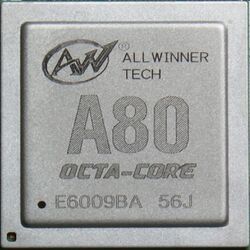A80
| A80 | |
|---|---|
 | |
| Manufacturer | Allwinner |
| Process | 28nm HPM |
| CPU | Octa-core big.LITTLE Cortex-A15/7 @ 2 (?)GHz |
| Memory | dual-channel DDR3/DDR3L/LPDDR3/LPDDR2, up to 8GB |
| GPU | 64-core Power VR G6230 |
| VPU | Video decoding MPEG 1/2/4, H.263, H.264, WMV9/VC-1, VP8 |
| Connectivity | |
| Video | HDMI 4K output, RGB LCD 2048x1536@60fps, dual-channel LVDS 1920x1080@60fps, 4-lane MIPI DSI 1920x1200@60fps, 4-lane eDP 2560x1600@60fps |
| Network | Unknown (Perhaps EMAC) |
| Storage | 4x SD/MMC, Raw NAND with 72-bit ECC |
| USB | 2x USB Host, USB 3.0/2.0 Dual-Role (host/device) |
| Other | HSIC for low power LTE |
| Release Date | June 2014 |
| Website | Product Page |
This is the second Power VR equipped Allwinner SoC, which formerly used the MALI series of GPUs. See also A31 (SoC)
Overview
Linux-sunxi support is not yet available, due to lack of devices and software.
Specifications
- CPU:
- ARM Cortex-A15/A7 dual Quad-Core
- 256KB L1-Cache
- 1MB L2-Cache
- 33bit address bus with theoretical 7.5G usable RAM (evb has 4G memory)
- GPU:
- Power VR G6230
- 64-core
- Comply with Open GL ES3.x, Open CL1.x, DirectX 11 level 9_3/10_0
- Video:
- UHD H.264/VP8 4Kx2K@30fps video playback
- Multi-format FHD video decoding, including MPEG 1/2/4, H.263, H.264. WMV9/VC-1, and others
- H.265/VP9 1080p@30fps video playback (by software, from A80 Datasheet page 11)
- H.264 HP/VP8 4Kx2K@30fps video capture
- 3840x1080@30fps 3D decoding, BD/SBS/TAB/FP supported
- 3840x1080@30fps 3D encoding
- RTSP, HTTP, HLS, RTMP, MMS streaming media protocols
- Display:
- dual-channel LVDS 1920x1080@60fps
- RGB LCD 2048x1536@60fps
- 4-lane MIPI DSI 1920x1200@60fps
- 4-lane eDP 2560x1600@60fps
- HDMI 4K output (Frame rate unknown)
- Camera:
- Integrated parallel and MIPI I/F sensor
- Supports 5M/8M/12M/16M CMOS sensor
- Supports 8/10/12-bit YUV/Bayer sensor
- Memory:
- dual-channel DDR3/DDR3L/LPDDR3/LPDDR2, up to 8GB
- Raw NAND with 72-bit ECC
- eMMC V4.5
- Connectivity
- 2x USB Host, USB 3.0/2.0 Dual-Role (host/device)
- Ethernet MAC
- 4x SPI, 7x TWI, 7x UART
- 4x SD/MMC
- HSIC
- PCM/I2S
- PMIC:
- AXP806 and AXP809
- Embedded Controller:
- ARM Cortex-M3 (to be verified)
- Audio:
- unknown
- OS:
- unknown
Documentation
- A80 Datasheet v1.0 (PDF, 43 pages, 2014-03-17)
- File:A80 Datasheet Revision 1.0 0404.pdf (same as the previous file)
- A80 Datasheet v1.1 (PDF, 43 pages, 2014-09-28)
- A80 User Manual v1.1 (PDF, 1008 pages, 2014-09-28)
- A80 Datasheet v1.30 (PDF, 43 pages, 2015-04-20)
- A80 User Manual v1.31 (PDF, 1056 pages, 2015-05-12)
- GPIO Pins
Register guide
Wiki
These pages have been put together by scraping information from the SDK.
Software
Original SDK
The SDK contains customized sources for U-boot, Linux, Android and buildroot.
SDK Content
- Linux Kernel: A80/lichee/linux-3.4
- Buildroot: A80/lichee/buildroot
- U-boot: A80/lichee/brandy/u-boot-2011.09
- Various Allwinner tools: A80/lichee/tools
Building images with the SDK
On Debian-like systems the following 32bit packages are required:
- lib32stdc++6
- lib32z1
To build the image:
wget http://dl.linux-sunxi.org/SDK/A80/A80_SDK_20140728_lichee.tar.gz tar -xzf A80_SDK_20140728_lichee.tar.gz cd lichee/ ./build.sh config ./build ./build pack
Boot0
Boot0 initializes the DRAM, basic clocks and loads U-boot from NAND or MMC. There is no boot1 on A80. Boot0 directly loads U-boot.
The sources can be found under https://github.com/allwinner-zh/bootloader/tree/master/basic_loader/boot0
Unfortunately you need the ARMCC (proprietary ARM C compiler) to compile the source code.
Binaries of boot0 can be found in the SDK under lichee/tools/pack/chips/sun9iw1p1/bin/
Android
Preliminary link to a Cubitech download for A80 kernel including a Android sun9i image OptimusBoard Boot Log (Android)
fastboot (under windows)
The optimus/pcduino8 board has the fastboot feature in its bootloader. Once booted into it, the device will identify itself as:
VID:1F3A PID:1010
Under windows, no driver can be found, but it is however possible to force the installation of the fastboot driver.
To make fastboot work from a PC, we need to change the fastboot code because Google hard-coded its partners into the fastboot source code. To be able to use fastboot we need to add 0x1F3A as Allwinner and compile this. A prebuilt windows binary is available here.
Android device repository
https://github.com/skoperst/android_device_sunxi_kylincommon https://github.com/skoperst/android_device_sunxi_kylinoptimus
U-boot
Allwinner
Sunxi Community
Kernel code
Allwinner Kernel
Sunxi Community
Cubietech Kernel
The cubietech guys have a kernel available.
GPL violations
As is usual, there are the libnand and libisp violations. But with A80, Allwinner decided to step this up a notch, or two, or all the way to 11.
Kernel
- modules/nand/sun8iw1p1/libnand_sun8iw1p1
- modules/nand/sun8iw3p1/libnand_sun8iw3p1
- modules/nand/sun8iw5p1/libnand_sun8iw5p1
- modules/nand/sun8iw6p1/libnand_sun8iw6p1
- modules/nand/sun9iw1p1/libnand_sun9iw1p1
- drivers/devfreq/dramfreq/mdfs/mdfs_sun8iw3p1.code Dram frequency scaling binary, run from SRAM while SDRAM is inaccessible.
- drivers/devfreq/dramfreq/mdfs/mdfs_sun8iw6p1.code Dram frequency scaling binary, run from SRAM while SDRAM is inaccessible.
- drivers/media/video/sunxi-vfe/lib/lib_mipicsi2_v1
- drivers/media/video/sunxi-vfe/lib/lib_mipicsi2_v2
- drivers/media/video/sunxi-vfe/lib/libisp
- drivers/media/video/sunxi-fd/lib/libfd Face detector.
- drivers/usb/sunxi_usb/usb3/libusb300 USB3.0 support.
- drivers/arisc/binary/arisc_sun9iw1p1.bin Cortex-M3 core for deep power save modes.
- drivers/video/sunxi/disp/de/lowlevel_sun9iw1/libdsi DSI support for display.
- drivers/video/sunxi/disp/de/lowlevel_sun9iw1/libedp eDP support for display.
- drivers/video/sunxi/hdmi/aw/libhdcp HDCP support for HDMI.
- drivers/input/touchscreen/aw5x06/libAW5306
- drivers/input/touchscreen/gslx680new/gsl_point_id_20131111
- modules/aw_schw/libschw
- arch/arm/mach-sunxi/pm/standby/super/resume/resume1.code
- arch/arm/mach-sunxi/pm/standby/standby.code
- drivers/net/ethernet/sunxi/eth/sunxi_libgeth
U-boot
- nand_sunxi/sun5i/libnand-sun5i
- nand_sunxi/sun8iw7/libnand-sun8iw7
- nand_sunxi/sun8iw8/libnand-sun8iw8
- nand_sunxi/sun8iw6/libnand-sun8iw6
- nand_sunxi/sun7i/libnand-sun7i
- nand_sunxi/sun9iw1/libnand-sun9iw1
- nand_sunxi/sun8iw9/libnand-sun8iw9
- nand_sunxi/sun8iw1/libnand-sun8iw1
Devices
Devices are slowly becoming available, here are some of the announced ones:
- Board CubieTech Cubieboard 8
- Board pcDuino pcDuino8. Has been since renamed to Arches, pcDuino8 is based on Allwinner H8
- Tablet Onda Onda V989 Octa Core A80T 9.7 Inch Retina Screen RAM 2GB Android Tablet PC 32GB
- Board OptimusBoard (created by Merrii for Allwinner, is sent to selected users by Allwinner to test the A80).
Tablets:
- Onda V989 A80T
- Teclast P98 Air
See also
References
External links
some more rumors before A80 release